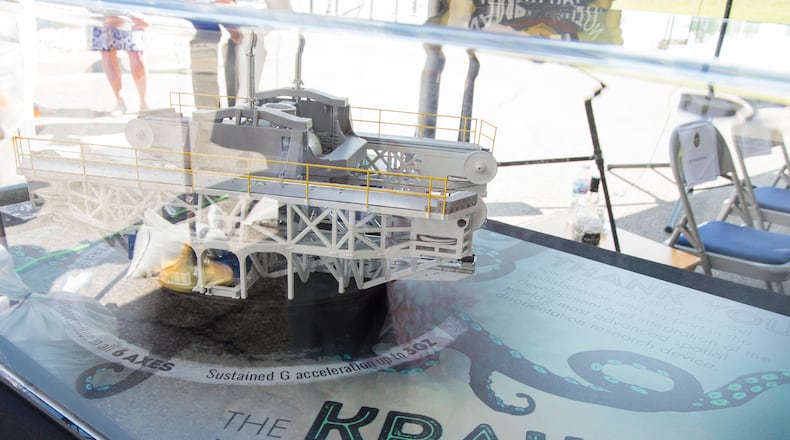Overseen by Air Force and Navy human performance experts — yes, the Navy has a very active presence at Wright-Patterson — the Kraken has been described as a “spacial disorientation device.” It’s essentially a human-rated centrifuge.
This story is free
We've opened this story as free to help you experience the important and entertaining journalism we're producing. Here are some ways you can follow our work:
- • READ: ‘Project Crispy’ addition would represent near-100% usage of former GM plant
- • READ: New Lebanon police rip new village leaders; their response? ‘Deal with it’
- • SIGN UP: Get the news of the day delivered to your inbox every morning with our free Morning Briefing newsletter.
- • SUBSCRIBE: Like what you see? Explore all special offers here
Zachary Wilson, a spokesman for the Naval Medical Research Unit at Wright-Patterson, said in an email Wednesday the study is being run by Johns Hopkins University and is funded by NASA.
Wilson said his unit “is facilitating the effort through the use of our unique medical research capabilities to include our Disorientation Research Device (DRD), or ‘Kraken.’ Our Naval Aerospace Medicine Research Lab is recruiting volunteers (must be TRICARE beneficiaries) for the study.”
“Are you active-duty military/a TRICARE beneficiary in or near Dayton?” the NASA Glenn Research Center recently asked on X. “If so, NASA needs you! We’re recruiting volunteers to spin at 2.5G in the Kraken, a device that helps us study space motion sickness. Learn more, view study requirements, & apply today.”
Are you active-duty military/a TRICARE beneficiary in or near Dayton? If so, NASA needs you!
— NASA's Glenn Research Center (@NASAglenn) April 30, 2024
We’re recruiting volunteers to spin at 2.5G in the Kraken, a device that helps us study space motion sickness. Learn more, view study requirements, & apply today: https://t.co/t1p3ciXeKg
Questions about the study were sent to representatives of NASA.
NASA is looking for volunteers between the ages of 21 and 60, free of major medical conditions or vestibular issues who aren’t pregnant, among other requirements.
Basically, NASA needs people who can withstand an hour of 2.5Gx exposure — that’s 2.5 times the normal force of gravity experienced at sea level — in the Kraken.
Participants can receive up to $250 in gift cards plus an additional $50 gift card for completing the study. Volunteers must have an off‐duty status or be on leave to receive compensation, NASA noted.
Those interested in the study are asked to contact Darci Gallimore at darci.gallimore.ctr@us.af.mil by June 14.
About the Author


